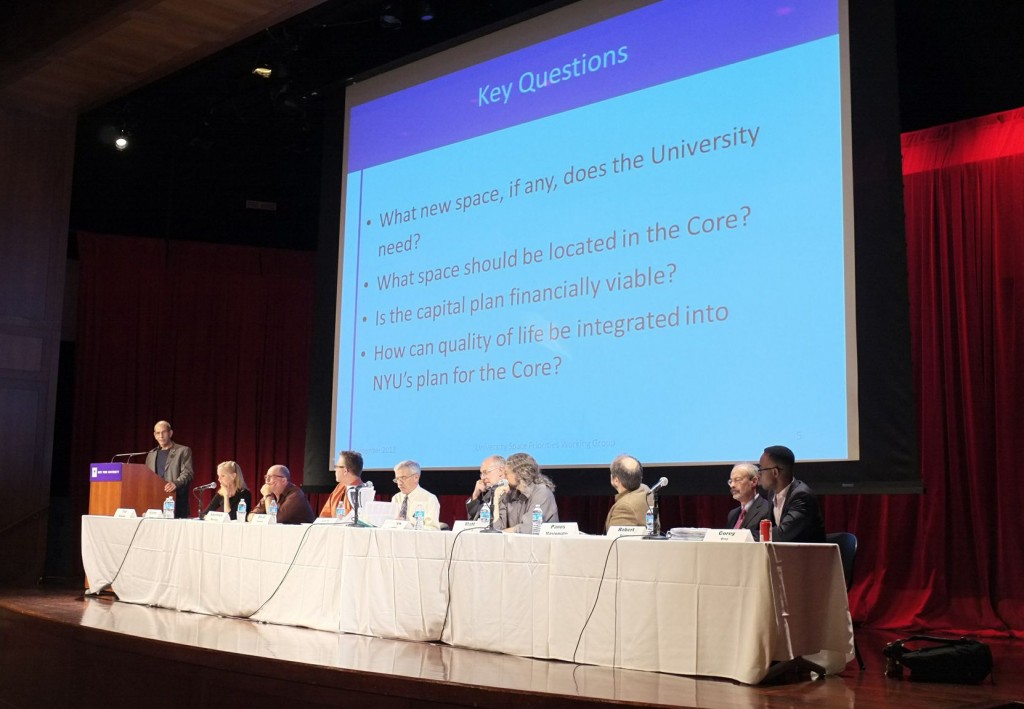
At the Space Priorities Working Group Town Hall meeting last night, some Greenwich Village residents showed that there is still a conflict between the community and the university over NYU 2031.
The town hall meeting took place in the Eisner and Lubin Auditorium in the Kimmel Center for University Life at 7 p.m. After the Working Group presented their interim report, putting an emphasis on classroom and student life space, they asked for comments and questions from the around 40 people in the auditorium.
President of the Washington Place Block Association Howard Negrin raised concerns about the impact the expansion will have on Village residents. He said the expansion should moved from the area around NYU’s Core block around Washington Square Park to a different location because the current plans were changing the nature of the Village.
“If NYU has a desperate need of new space, many in the community have suggested a sensible alternative to this mindless growth in the village,” Negrin said. “That alternative is the Financial District.”
Chair of the working group and professor of Media, Culture and Communication Ted Magder said the overall expansion will go beyond the Core, but there are certain activities that the group believes must be near the Core. Magder added that of the 38 departments that passed resolutions about the plan, 17 opposed the plan and 16 raised serious questions about the expansion but did not affirm or oppose the plan.
“The Core is a very important, meaningful and precious space for you, for me as a resident, for the university, our students and our faculty, so that’s the challenge of the Core,” Magder said.
“To an academic, a serious concern is different from an opposition,” Magder said.
Village resident Mary Johnson, over 60 years old, commented after the meeting that she and other residents have never had a problem with students.
“We are supportive and behind the students of NYU,” Johnson said. “We think the university should tone it all down and look at other areas of the city.”
Commuter Student Council president and Stern junior Rosario Giarratana also spoke of the pressing need for commuter student space, which the Working Group strongly agreed with.
CAS senior and Student Council senator Kevin Jones said he is pleased that the group addressed the importance of student interests in the expansion plans, one of the biggest concerns he and other students had.
“I definitely saw a major improvement this time as far as making students the focus,” Jones said.
The first Town Hall Meeting of the school year with NYU President John Sexton, led by the Student Senators Council, was also held yesterday before the working group meeting. Around 80 people, mostly students, sat in Lipton Hall to listen to the question-and-answer segment with Sexton.
President of the SSC Mariam Ehrari said she was pleased with how the Town Hall with Sexton went, but was disappointed that there were not any questions about the current controversies that have been floating around recently.
“It’s disheartening to read the information and complaints out there, and then not have those people present to ask questions regarding their concerns when we bring the president of the university directly to students in an open forum where anyone could literally ask anything,” Ehrari said.
When asked how NYU plans to maintain its trajectory as a top-ranked university, Sexton responded that the university’s global network is the key to its future prosperity.
A SCPS student told Sexton he had concerns about some faculty not stepping up to the expectations him and his classmates have for their education.
Sexton, a teacher himself, said he is constantly proud of his colleagues, but knows there are cases when faculty need to be addressed.
“There are slips, and all I can say to all the students is, if there is a slip, don’t hesitate to let us know,” Sexton said.
Another question was posed by the NYU Divest group regarding their recent letters requesting that the university divest from fossil-fuel companies.
Sexton said there are consequences to divestment, and the university is also not able to do exactly what the group requests.
“The fact of the matter is that this particular request is not germane to our university because we don’t own stocks,” Sexton said.
He explained that the university invests in investors, but does not know what they invest in. The university could only decide to invest in investors who promise to only invest in certain funds, but the Board of Trustees currently does not do that. Sexton said the group should go through the University Senate to influence the board.
Other topics addressed opportunities for entrepreneurial students, possible contracts for student-run businesses and disruptive construction near the School of Medicine.
SCPS junior Tramone Miles said Sexton is very personable and answered all the questions, but students should follow through to make sure these answers are turned into actions.
“We get something started, and we want to see it to fulfillment,” Miles said. “We just have to keep asking questions and keep following up.”
A version of this article appeared in the Wednesday, Sept. 18 print edition. Nicole Brown is a news editor. Kate Metcalfe is a contributing writer. Email them at [email protected].























































































































































